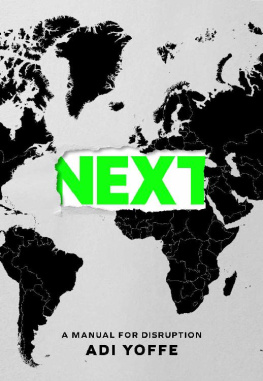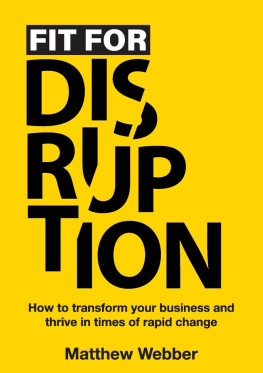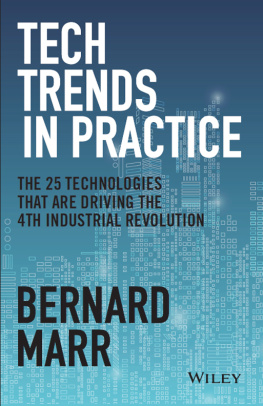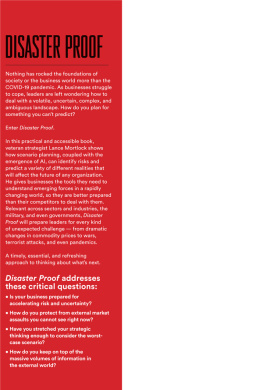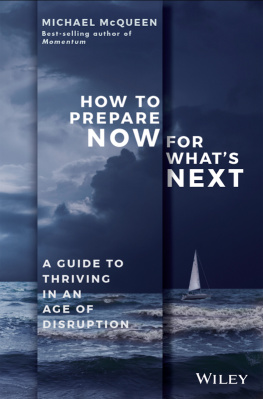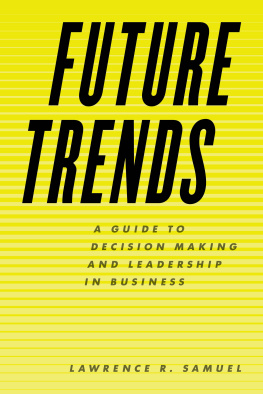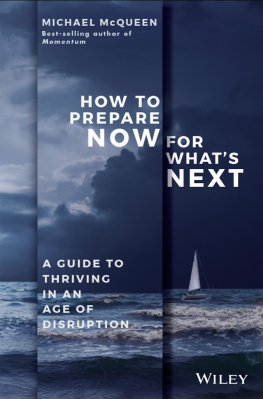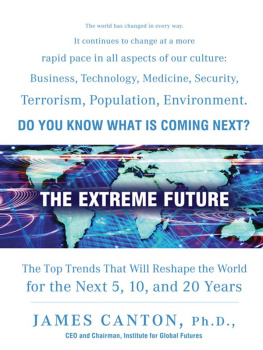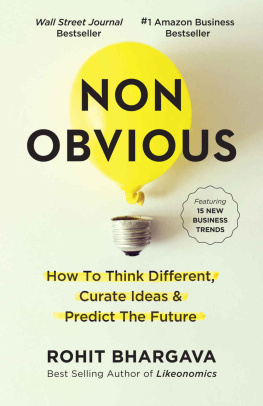The author has provided this e-book for your personal use only. You may not distribute this e-book in any form or manner. Copyright infringement is against the law.
For information regarding copyrights, lectures, seminars and further issues, please contact
Who is the wise one? He who sees what is to come.
IN LIEU OF AN INTRODUCTION
If I go to a good school, does that guarantee that Ill have a good job? If I follow in the footsteps of the greatest entrepreneurs of the twentieth century, will I manage to establish the next Google? If I learn from the past, will I be better equipped for the future?
Well, no. Our world demands that we take a broader perspective, a more complex process of deduction and, most of all, the old adage: the more we know, the less we know.
In other words what is trendology, and what I actually do for a living.
When I was a little girl, my parents always told me how important it was for me to be a good student. Being a good student is the first step on the road to a happy, successful life. The second is being a good university student, attending the best schools, graduating at the top of the class and reaching the end of the line just as her parents had planned. The pinnacle of happiness was a corner office on the 45 th floor of a global corporation skyscraper. I was five, and my parents had already planned out the right future for me and the road that would lead me there. I did (some of) my part in the mapped-out journey.
The path outlined by my parents seemed, at least at the time, to be the right one. They wanted me to have security: Just like other baby-boomers, their plan could tolerate zero changes and the minimal number of stops: my career was supposed to start and end at either a corporation or a government job; retire on a great pension and benefits after a long tenure, and live a perfect, carefree life. Finally, I could die happy, but more importantly, safe and secure.
When parents tell their kids if you do X, Y would happen, they implement the thinking patterns that characterize all of us, thinking patterns that rely on past experiences: if you run into the street, youll get hurt; if youll ride without a helmet, you better pray to god youd get back in one piece; if you have unprotected sex, even your mother cant help you there. I, the responsible adult, know how dangerous it is to run into the street, ride without a helmet or have unprotected sex.
But what about more complex situations? For us parents, the desire to provide our children with a good life, paired with our own life experiences, allows us to spout out the near-absolute if > then statements concerning the future to come. I can tell my teenage son that its important to learn a foreign language, because it will help you get ahead in life. The logic behind it is that we live in a global reality, and a foreign language is a vital tool.
These statements told by parents to their children are based on some pretty interesting assumptions: first, that whoever has more experience also has more knowledge about the future; second, that ones personal past experience applies to the future. So, for instance, if two correlating events are taking place (for example, someone who speaks several languages will have better chances in the business world), that means things will stay pretty much the same in the future. My parents based their advice on things that happened to their friends kids, their own life experience, and even studies and guidebooks. If things were one way in the past, they should be the same in the future. But is that still the case? Two decades into the twenty-first century, can I still rely on my personal experience, on the experiences of friends, or studies and books, to predict the future?
The 2020 Coronavirus pandemic, a fuse that was lit in China and soon covered the world, proves that the answer is NO.
My parents were no scientists, but they observed the world and realized that there is a correlation between education and professional success. They and many others were guided by the empiricist approach which drove them to educate me and my sisters the way they did. But it wasnt just certainty that led them, but also a guiding hand that did everything in its power to control life, and in fact, the future.
But what happens when nothing makes sense anymore? What if we cant draw a path towards the future, because we are not certain about the present - or even the past? What if everything we thought we knew about the future is suddenly disrupted?
Empiricism
Empiricists claim that human knowledge is based on experience, and that knowledge can be acquired through an inductive system of inference, which shapes our experiences into concepts. Rationalists, on the other hand, claim that human knowledge is based on reasoning, and that is what shapes our knowledge of the world.
Some might say that a link exists between the intensity of ones vision and their perception of the future, and their ability to realize it. In other words, the more concrete and tangible a persons perception of the future is, the more desirable and attractive it is, so is it able to motivate a person, a group or even an entire organization to work towards realizing the possibilities of the future. I believe that this knowledge, even if it is subconscious, motivated my parents and many other parents over generations to create a vision that will form the infrastructure for developing the best future for their children.
In my defense, I lived up to many of my parents visions. But I strayed from the path: I was a journalist and I worked in parliament, I studied communications and sociology, then philosophy (of all things!), taught in academia and worked with huge corporations; I was both self-employed and a corporate employee, and to be perfectly honest I have no idea whats going on with my pension plan. I mean, I know what Im doing to earn it, but I dont know if the same institutions my parents relied on will still be around, at least in the same familiar concept, to see me safely and comfortably through old age. I deviated from the path they mapped out for me, and that gave me the opportunity to observe it from the sidelines. This perspective gave birth to the methodology I carefully crafted over the past decade, outlined for your reading pleasure in this book a new way of looking at the future.
This path, too, dates back to my childhood. Even as a twelve-year-old, I was fascinated with the world of phenomena. My parents still have an old clipping from a local paper, a short text I wrote about a social phenomenon that caught my attention: Why did kids my age have posters of favorite singers plastered all over their walls? I wanted to know why people act the way they do, and only later did I figure out the true question: What makes a social phenomenon what it is, and can it be predicted?

